Almost forgotten: the fate of lesbian women in Austria
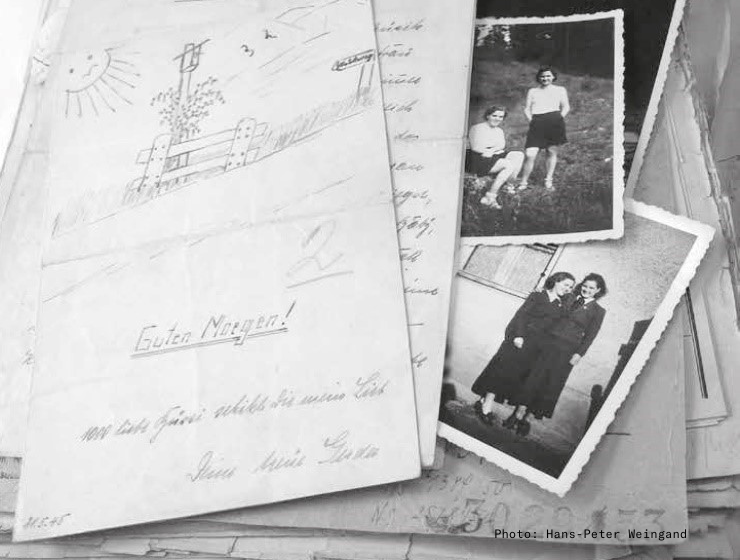
Until 1971, homosexuality was strictly forbidden in Austria. For almost 120 years, not only men but also women were charged and convicted of “unnatural same-sex fornication”. During the Nazi era and shortly afterwards, their numbers were particularly high, as research in recent years has shown. Documents from the Arolsen Archives help historians reconstruct the fates of individual victims – like Maria Glawitsch, Johanna Perkounig, and Angela Fasching.
In Germany during the Nazi era, homosexual men were persecuted, arrested, and deported to concentration camps, where they had to wear a “pink triangle” as an identification mark. Thousands of them died in the camps. Conversely, sexual acts between women were never officially forbidden in Germany. The “fornication paragraph,” Paragraph 175, applied exclusively to men. That explains why the persecution of lesbian women by the Nazi regime was secret and indirect.
Lesbian women were considered outsiders because they did not fit in with the National Socialist image of women. They were often denounced, some of them were arrested under a pretext and then deported to concentration camps as “anti-social elements” or “political prisoners”. This hinders systematic research into the persecution of lesbian women and the search for information about the fates of individuals.
Criminal files from Austria provide clues
Austrian criminal law included Paragraph 129Ib, which penalized same-sex acts between women as well as men. This provision remained in force after the “Anschluss” in 1938. By studying criminal files in Austria and comparing the names they contain with the names on concentration camp documents in the Arolsen Archives, in recent years researchers have been able to show that Paragraph 129Ib was interpreted particularly rigidly. The number of women under investigation more than doubled in Vienna. “Unnatural fornication with persons of the same sex” was punishable under Paragraphs 129 and 130 of the Criminal Code dating back to 1852 with severe imprisonment for up to five years.
Maria Glawitsch – sentenced and deported
One example is Maria Glawitsch, born in Graz in 1920. Not until 2021, was a “Stolperstein” (commemorative plaque) laid to commemorate her fate. She was just 19 years old when she was convicted of “unnatural fornication” for the first time. According to Gestapo court files, she had “committed unnatural fornication” as a prostitute with an older woman at the behest of a client in 1939. After she had served her six-month sentence, she soon came to the attention of police investigators again.
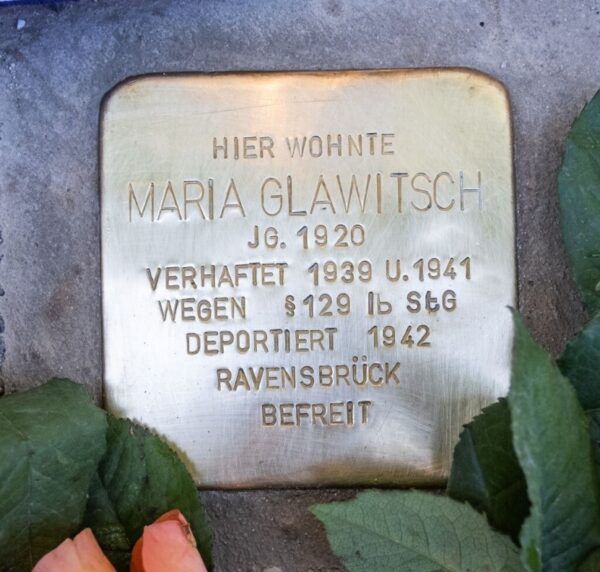
Source: Verein für Gedenkkultur Stolpersteine in Graz / Association for commemorative culture Stolpersteine in Graz
From April 1940 onwards, she was wanted for “rent theft” because she had reportedly rented hotel rooms under a false name and failed to pay the hotel bills. In 1941, she was again convicted of same-sex sexual acts and fraud. After she served her prison sentence, the National Socialists deported her directly to the Ravensbrück concentration camp on November 5, 1942. Maria Glawitsch survived the concentration camp, got married in Vienna in 1946, and remarried in 1958. She died in Graz on October 13, 1966.
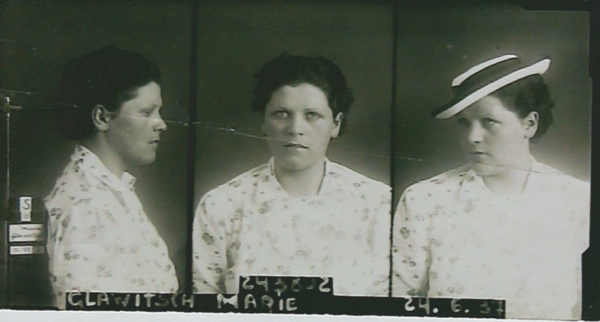
Maria Glawitsch, Source: LG f. Strafsachen, A11-Vr-Strafakten LG 1, 2384/1942. She was born in Graz in 1920. Both parents came from the Slovenian-speaking region of Lower Styria and their name was originally Glavič. Her father Leopold worked for the Southern Railway. In 1963, he submitted a search request to the Arolsen Archives.
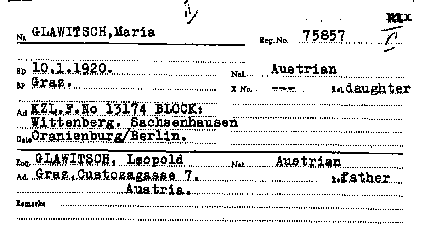
Search request from Maria’s father Leopold, kept in the Arolsen Archives
Johanna Perkounig – deported to Ravensbrück and Mauthausen
Johanna Perkounig from Klagenfurt was just 18 years old when the authorities accused her of “unnatural fornication”. The files state that she had “found sexual satisfaction” with another patient in a Klagenfurt hospital in 1942. She was sentenced to one year in prison, which she spent at the women’s prison in Aichach in Upper Bavaria. In January 1945, she was sent to the Ravensbrück concentration camp, and on March 2, 1945, she was crammed into a cattle wagon together with 2,100 women and children and deported to the south. 120 people died on the five-day transport. Johanna survived for the time being. This is evident from the prisoner registration card that has been preserved from the Mauthausen concentration camp. Her subsequent fate is unknown.
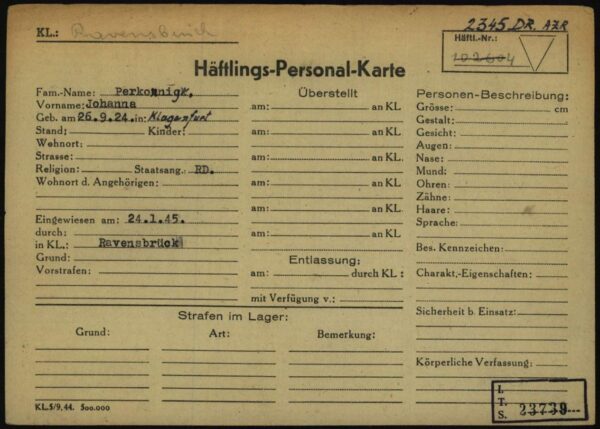
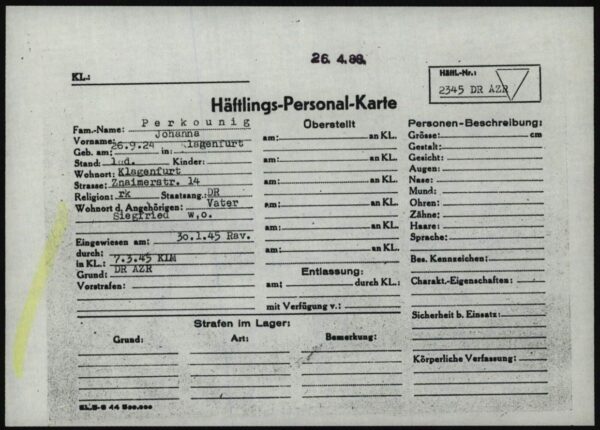
Johanna’s prisoner registration cards from the Ravensbrück and Mauthausen concentration camps. The reason for her detention is given as “DR AZR”, which stands for “Arbeitszwang Reich” (Reich compulsory work) and the prisoner category “Asozial” (anti-social element).
Angela Fasching – persecution continued after the war end
Another woman’s fate shows that the persecution of lesbian women in Austria continued in the post-war period. Angela Fasching from Graz was deported to the Ravensbrück concentration camp in 1944 after serving a prison sentence as an “anti-social element.” She was 28 years old when she arrived there – we do not know whether her homosexuality played a part in the decision to detain her. After liberation of the camp, she returned to Graz. In the post-war years, she was denounced because of her homosexuality, was remanded in custody, but was released before the trial and went into hiding. Not until 1976 was the arrest warrant against the then 60-year-old revoked.
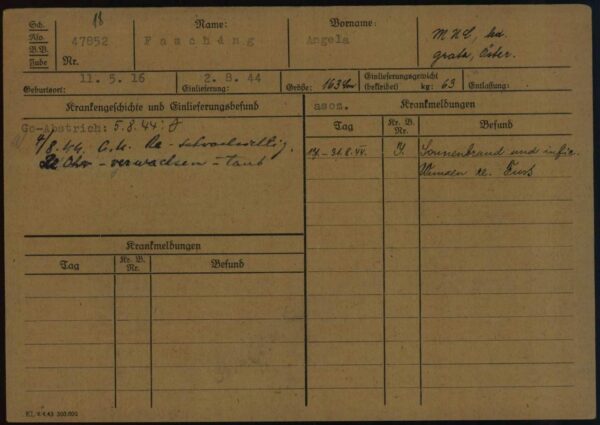
Only a so-called sick-bay card from the Ravensbrück concentration camp has been preserved, which was issued to Angela Fasching in the concentration camp infirmary. Infirmaries were places of neglect with a lack of medical care and hygiene.
Late recognition and compensation
After the abolition of the “fornication” paragraph 129Ib in 1971, it took until 2002 for the last regulations on same-sex sexual acts to be completely removed from Austrian criminal law. People deported to concentration camps during the Nazi era as “anti-social elements” or because of their homosexuality were entitled to benefits under the Victims’ Welfare Act in Austria from 2005. In Germany, they were not recognized as victims of National Socialism until 2020.

